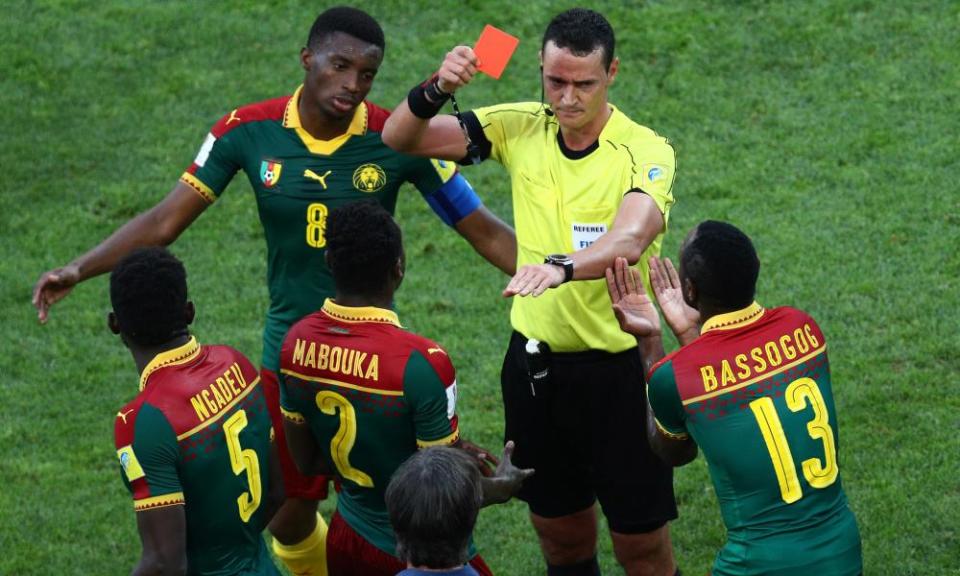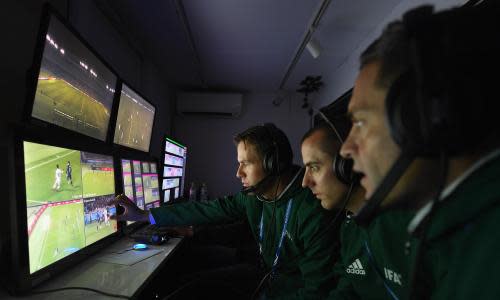Explained: How VAR will work at the World Cup
This summer technology will free up the World Cup, eliminate serious refereeing errors and put an end to on-field controversy. Alternatively, it will create just as many problems as it solves, undermine match officials, and turn the world’s favourite activity into a series of long pauses only briefly interrupted by sport. Take your pick.
Ever since Fifa announced that video assistant referee technology (VAR) would be used in each of the 64 matches at Russia 2018, there has been a sense of foreboding in the air. Even among enthusiasts for the system, by no means the vast majority of people within the game, there are fears it could be too much, too soon. One counter-argument however, made at the highest levels, is that technology has to play a greater role in modern football and the sooner it starts the better. So here’s what to expect from VAR at the World Cup.
What will it do?
The role of VAR is to correct “clear and obvious errors” made by referees in any of four “game-changing” situations. Those four situations are: goals, penalties, red cards and cases of mistaken identity. The process involves going over video footage of every such situation to check for problems. Let’s say an error is spotted reviewing footage in the buildup to a goal, an attacking player being clearly offside, say. The VAR will advise the referee of that fact and the referee will then have the opportunity to correct his decision. The VAR can only advise on this, and the referee’s decision will be final.
READ MORE: Ozil and Gundogan fallout could affect Germany
READ MORE: Leeds hope to confirm Bielsa appointment
READ MORE: Ljungberg returns to Arsenal as U23 coach
How will it work?
Fifa has appointed 13 officials to perform the roles of VAR in the World Cup and they will operate from an HQ in Moscow. Each match will have one VAR and a team of three assistants given access to footage from 33 cameras, eight of which record in slow motion. If the team discover an error, the VAR would then contact the referee on the field via an earpiece, advising him either of an error, or that they should check a decision themselves. The referee can then act on that information immediately or choose to review footage on a pitch-side screen. In the second instance the referee can either revisit the original decision or leave it untouched.
The problems so far
VAR has undergone trials across the world during the past 18 months. Sometimes the technology has failed, though rarely. According to a study conducted on the trials, VAR increased the accuracy of refereeing decisions from 93% to 98.8%. The problem comes less in applying the letter of the law than in its spirit. The biggest issue being: what is a “clear and obvious” error? During the trials it became highly apparent that such a term is subjective and leads to inconsistent decision-making, not necessarily within a game but across matches. A second problem, which matters very much during a match, is that making decisions via the VAR takes time and often interrupts the flow of play.

Any changes made for the World Cup?
Up until now fans watching a game involving a VAR have sometimes struggled to work out what has been going on. This summer, Fifa will use a “networked touch tablet” (iPad to you and me) to convey information to broadcasters and in-ground “infotainment” (the big screens in stadiums) so that people can be kept up to date. That’s the good news. The bad news is that while the newly appointed VARs will have experience of the technology, most of the officials making decisions on the pitch this summer will not. This seems highly likely to complicate the decision-making process further.
READ MORE: Delph discusses Pep impact after career turnaround
READ MORE: Zidane coy on next move amid France links
READ MORE: Spurs given extra time to weigh up Wembley return
How much is riding on this?
Well, it depends on whether screwing up an event that absorbs the attention of the entire world and generated just under $5bn in revenue for Fifa in 2014 is a big deal or not. There will be more technology available to more people to try to make sure the system works properly, but if it causes problems in the first week of the tournament, expect someone to intervene, whether publicly or otherwise.

 Yahoo Sport
Yahoo Sport 






































